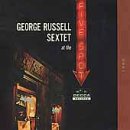A chance for an underground classic
James W. Goetsch | Studio City, CA. USA | 10/03/2000
(4 out of 5 stars)
"This is a chance to pick up one of the most rare George Russell releases. This is a sextet date that features a group that includes students from his legendary Lennox School days. One of the students here, David Baker, ended up being a leading jazz educator himself.Russell's sextet records from the early to mid '60s feature a level of creativity that is almost unmatched to this day in the jazz world. Forget the usual melody-solos-melody routine, all of his work from the era has tightly focused yet intricate compostion that merits and rewards repeated listening. He always finds soloists with unique voices to light up the improvisational sections, as you will find here. So here's a rare chance to pick up some great work from an artist that still has not had anywhere near the recognition he deserves."
Challenging small-group music
N. Dorward | Toronto, ON Canada | 10/23/2000
(4 out of 5 stars)
"This is the least-known of Russell's early discs, one of three he recorded for Decca before his move to Riverside. It's not as important a disc as the monumental _Jazz in the Space Age_, a big band record centred on the piano duo of Paul Bley and Bill Evans, a date which remains one of the greatest of postwar jazz recordings. Yet the Five Spot disc is a fine record on its own merits: none of the players except for the bassist Chuck Israels went on to become a well-known instrumentalist, but the young players here are all superlative & full of personality: Al Kiger on trumpet, David Young on alto, Dave Baker on trombone (he's since become a cellist & noted composer & educator); & the very swinging Joe Hunt on drums (whatever happened to him??). Russell's "arranger's piano" is actually very accomplished, his comping containing chordal shapes that must have been a constant challenge to the soloists.The tunes here are mostly sophisticated variants on the blues, including a memorable polytonal arrangement of Miles Davis's "Sipping at Bells". (It's rarely been noted that the blues was always a strong component of Russell's thinking: virtually all his early discs have a blues, such as the superb "Honesty" on _Ezz-Thetic_, or the radically altered version of "Au Privave" on _The Outer View_, or the title-track of _Stratusphunk_. & let's not forget Russell's latterday fondness for "So What", which he's recorded now a few times.) The performances are all very tight, and the disc ends on a fiery "Moment's Notice", where player's solo climaxes on a breakneck stoptime chorus. -- A fine disc: those who pick it up (perhaps tempted by the knowledge it's in only a limited-edition release) will not be disappointed, & will want to hunt down the other Russell discs from this period."


 Track Listings (6) - Disc #1
Track Listings (6) - Disc #1